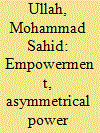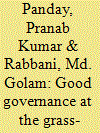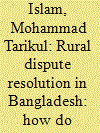|
|
|
Sort Order |
|
|
|
Items / Page
|
|
|
|
|
|
|
| Srl | Item |
| 1 |
ID:
156529


|
|
|
|
|
| Summary/Abstract |
In the wider context of growing digitalisation in South Asia, this article examines the impacts of a public–private–people partnership (4Ps) information and communication technology (ICT) initiative of the Bangladesh government, administered through local governmental offices, the Union Information Service Centre (UISC). Scrutinising the operation of six UISCs in rural communities across Bangladesh, the study researches the potential of ICTs to influence existing asymmetrical power relations and empower local people. Asking to what extent ICTs enable more people to actively participate in their communities and what the implications for empowerment are, it is found that top-down ICT intervention by itself cannot bring substantial change for people at the bottom of the social pyramid. Asymmetrical power relations continue to deprive marginalised groups from receiving the claimed benefits of ICT facilities. The study suggests the need for a more critical, practice-focused understanding of relationships between ICTs and rural empowerment, while also highlighting the changing modalities of connecting states and their citizens in postmodern South Asia.
|
|
|
|
|
|
|
|
|
|
|
|
|
|
|
|
| 2 |
ID:
127685


|
|
|
|
|
| Publication |
2011.
|
| Summary/Abstract |
Considering the importance of good governance, the article explores the governance situation of the lowest local government tier (Union Parishad) in Bangladesh. Through the application of four good governance indicators-leadership, people's participation, transparency and accountability and equity-the expectation is that the findings would add a new dimension to the existing knowledge of local governance. Based on empirical data collected from the field, the study findings suggest that the governance situation at the local level is not conducive for the establishment of good governance and strong local democracy in the country. Despite incorporation of different provisions (ward shava, open budget, citizen charter and right to information) in the Local Government (Union Parishad) Act of 2009, the government has failed to ensure participation, accountability, good governance and transparency. Against this backdrop, the governance of local government bodies has been characterised by reluctance of local government leaders in ensuring development, lack of people's participation, transparency and accountability and unequal distribution of services.
|
|
|
|
|
|
|
|
|
|
|
|
|
|
|
|
| 3 |
ID:
165246


|
|
|
|
|
| Summary/Abstract |
The rural poor and other marginalized people in Bangladesh are caught in a quandary. Neither the formal judicial system nor informal dispute resolution through local tribunals, called Shalish, is able to meet their needs. The formal system is hardly accessible and affordable to them and suffers from millions of pending cases. Informal dispute resolution through Shalish is notorious for unfair decisions based on local power structures and backward norms, as well as draconian enforcement practices. To remedy this situation, a 2006 law has reformed and redesigned Shalish under the guise of village courts. These village courts were introduced as an accessible, fair and affordable alternative to both the formal judicial system and traditional Shalish, but experience since 2006 has shown that they have their own flaws and require further reform. Drawing on popular perceptions in two Bangladeshi villages, this study finds that more attention should be paid to access for poor and otherwise vulnerable people, procedural fairness shielding litigants from local power structures, and matters of effectiveness. Only then can village courts truly fulfil their promise of providing redress for those most in need of social justice and human security.
|
|
|
|
|
|
|
|
|
|
|
|
|
|
|
|
|
|
|
|
|